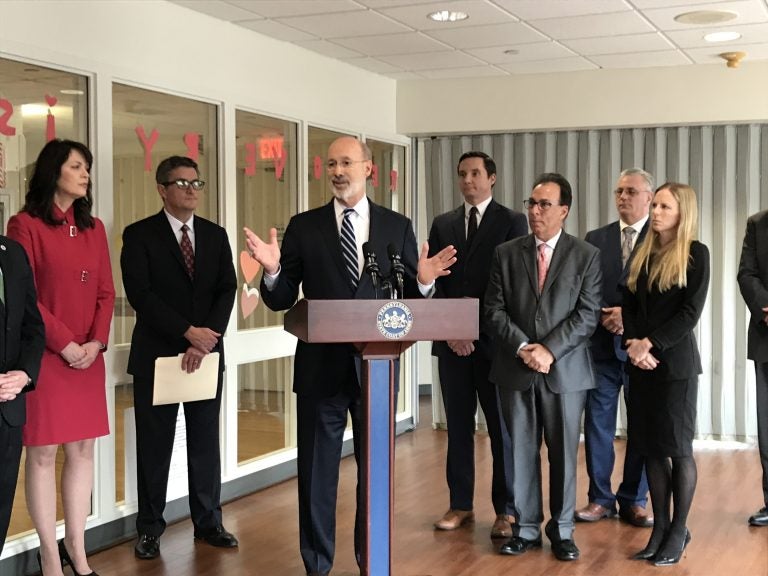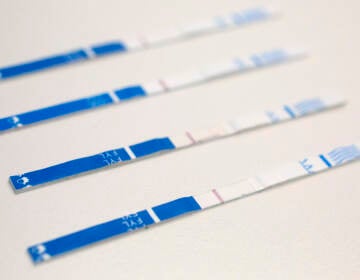Pennsylvania cuts red tape for medication-assisted treatment for opioid addiction
Pa.'s Medicaid program will no longer require doctors to get approval when prescribing medications that are proven to help people stay off heroin and prescription painkillers.
Listen 1:45
Governor Tom Wolf speaks at the First Steps Treatment Center at Chester-Crozer Medical Center. (Joel Wolfram/WHYY)
Pennsylvania Gov. Tom Wolf announced Thursday that the state is ending a policy that delayed getting treatment for people addicted to opioids.
The state’s Medicaid program will no longer require doctors to get approval when prescribing medications that are proven to help people stay off heroin and prescription painkillers.
Wolf said the state will be ending this so-called “prior authorization” requirement. It can lead to delays of 24 hours or more before patients can get a hold of medications such as Suboxone and Vivitrol. These are used together with psychotherapy to help people stop using heroin or prescription painkillers, in what’s known as medication-assisted treatment, or MAT.
“MATs work — they’re part of an overall strategy that can help all kinds of people,” Wolf said. “This step that I’m announcing today is going to increase access to this lifesaving treatment for those who suffer from substance use disorder across the commonwealth.”
The governor made the announcement at the First Steps Treatment Center at Crozer-Chester Medical Center.
“Lifting that 24-hour period will literally save lives for us,” said Kevin Caputo, president and chairman of psychiatry and behavioral health at Crozer-Keystone Health System.
Caputo said some patients overdosed after being discharged from inpatient rehab while waiting for approval.
The policy applies to all three medications approved by the U.S. Food and Drug Administration for use in MAT: methadone, buprenorphine (the generic drug in Suboxone), and naltrexone (the generic name for the drug in Vivitrol).
The prior authorization requirement has also been a roadblock for patients seeking to begin treatment in an outpatient setting, and has complicated efforts to ease the path to treatment after an overdose that lands a drug user in the emergency room.
Many private insurers began eliminating their prior authorization requirements last year after a lawsuit from New York Attorney General Eric Schneiderman. The change has been endorsed by the American Medical Association, and some treatment advocates felt Pennsylvania had been dragging its feet on the issue.
The state is giving the insurance companies that run its Medicaid managed care plans 60 days to fully implement the new policy, said Meg Snead, Wolf’s deputy secretary of policy and planning.
Snead said the policy came under review after the state’s declaration of a public health emergency in January.
The state waited to lift prior authorization for MAT, Snead said, not “because we didn’t think it was a good idea, [we] just wanted to make sure it was well thought out and that we were looking at best practices in other states.”
Snead said the policy helped Medicaid administrators ensure patients were getting the appropriate therapy along with their medications. But she said they have other ways to do that that don’t put patients lives at risk.
WHYY is your source for fact-based, in-depth journalism and information. As a nonprofit organization, we rely on financial support from readers like you. Please give today.





